Ulcerative colitis is a chronic inflammatory bowel disease that inflames the colon lining. Many people with this condition struggle to fall asleep or stay asleep because pain, urgency and medication side‑effects keep the body on high alert. This guide breaks down why sleep gets tangled with ulcerative colitis and offers practical, science‑backed tips that can turn restless nights into refreshing sleep.
Why Ulcerative Colitis Messes With Your Sleep
Understanding the root causes makes it easier to target them. Three main factors link ulcerative colitis to poor sleep:
- Physical symptoms: Cramping, frequent bowel movements, and nocturnal diarrhea interrupt the sleep cycle as soon as the brain senses a need to use the bathroom.
- Inflammatory hormones: The disease raises levels of cytokines such as interleukin‑6 (IL‑6) and tumor necrosis factor‑alpha (TNF‑α). These cytokines act like internal alarm clocks, boosting cortisol and suppressing melatonin, the hormone that tells us it’s time to wind down.
- Mental load: Living with a flare‑prone condition fuels anxiety and stress, which in turn overload the hypothalamic‑pituitary‑adrenal (HPA) axis and keep the mind racing at night.
Because these mechanisms overlap, treating sleep issues often requires a multi‑pronged approach.
Adjust Your Medication Schedule Wisely
Many ulcerative colitis patients take aminosalicylates, steroids or biologic therapy. The timing of these drugs can either help or hurt sleep.
- Aminosalicylates (e.g., mesalamine): These are generally safe at bedtime, but if you notice stomach upset, move the dose to earlier in the evening.
- Systemic steroids: Corticosteroids like prednisone can spike cortisol and trigger insomnia. If a steroid taper is unavoidable, aim for a morning dose and discuss a low‑dose nighttime rescue plan with your gastroenterologist.
- Biologic injections (e.g., infliximab, adalimumab): Since they’re given every few weeks, they don’t directly influence nightly hormone patterns, but watch for flu‑like side effects that can keep you awake.
Always coordinate dose changes with your doctor; abrupt shifts can provoke a flare.
Fine‑Tune Your Evening Routine
Good sleep hygiene works for anyone, but people with ulcerative colitis need a few extra tweaks.
- Wind down 60 minutes before bed: Dim the lights, turn off screens, and practice a calming activity-reading, gentle stretching, or a brief meditation.
- Limit fluids after dinner: Aim for a 1‑2 hour “no‑drink window” to reduce nighttime bathroom trips.
- Watch caffeine and alcohol: Even a small espresso after 2 p.m. can linger in the system. Alcohol irritates the gut lining and can trigger diarrhea, so keep it to a minimum, especially on flare‑prone days.
- Choose a gut‑friendly snack: If you need a bite, go for low‑residue foods like plain yogurt, a banana, or a small handful of almonds. Avoid spicy, high‑fiber, or high‑fat foods right before bed.
- Set a bathroom alarm: A gentle vibration alarm can remind you to use the restroom before you’re fully asleep, cutting down on sudden awakenings.
Leverage the Body’s Natural Sleep Hormones
Melatonin and cortisol are the two hormones most affected by ulcerative colitis.
- Melatonin supplements: A low dose (0.5-1 mg) taken 30 minutes before bedtime can help reset the circadian rhythm, especially if you’re on steroids that blunt melatonin production.
- Cortisol‑balancing strategies: Morning sunlight, regular exercise, and a consistent wake‑time help keep cortisol peaks in the morning and lower them at night.
Before adding any supplement, ask your healthcare provider to rule out interactions with your current meds.
Mind‑Body Techniques to Calm the Brain
Stress and anxiety are common companions of ulcerative colitis, and both sabotage sleep. Here are three low‑cost methods that fit easily into a busy life:
- Progressive muscle relaxation: Starting at your toes, tense each muscle group for five seconds, then release. Work your way up to the head. This signals the nervous system that it’s safe to relax.
- Guided breathing (4‑7‑8 method): Inhale through the nose for 4 seconds, hold for 7, exhale through the mouth for 8. Repeat four cycles. The pattern activates the parasympathetic response.
- Journaling: Spend five minutes writing down worries, flare‑related concerns, and a to‑do list for the next day. Offloading thoughts reduces rumination that keeps the mind buzzing.

Support Your Gut - The Sleep Connection
The gut microbiome talks to the brain via the gut‑brain axis. An imbalanced microbiome can amplify inflammation and disturb sleep.
| Trigger | Impact on Sleep | Management |
|---|---|---|
| Frequent diarrhea | Wakes you multiple times | Low‑residue diet in the evening, scheduled bathroom breaks |
| Abdominal pain | Difficulty falling asleep | Heat pack, gentle yoga, prescribed pain relievers (as directed) |
| Nighttime medication side‑effects | Restlessness, vivid dreams | Discuss timing adjustments with doctor |
| Gut dysbiosis | Inflammatory spikes, mood swings | Probiotic supplement (e.g., Lactobacillus rhamnosus), fermented foods |
| High caffeine intake | Delayed sleep onset | Limit caffeine to before 2 p.m. |
Adding a daily probiotic and eating prebiotic‑rich foods like cooked carrots or oats can gently rebalance the microbiome, which recent studies link to improved sleep efficiency.
When to Call Your Healthcare Team
Sleep problems can be a red flag that a flare is brewing. Seek professional advice if you notice any of the following:
- More than three nocturnal bathroom trips in a night, despite fluid restriction.
- Sudden increase in abdominal pain that wakes you from sleep.
- New or worsening fatigue that doesn’t improve after a full night’s rest.
- Side‑effects from medication that interfere with sleep for more than two weeks.
Early intervention-whether it’s a medication tweak, a nutrition plan, or a mental‑health referral-can prevent chronic sleep deprivation and protect overall disease management.
Tracking Your Sleep Progress
Data beats guesswork. Use a simple spreadsheet or a sleep‑tracking app to log:
- Bedtime and wake‑time.
- Number of bathroom trips.
- Pain or urgency level (scale 1‑10).
- Medications taken and timing.
- Dietary notes (caffeine, fiber, probiotic intake).
After two weeks, look for patterns. If bathroom trips spike after a certain food, you’ve found a trigger. If a new medication coincides with later sleep onset, discuss a timing change with your doctor.
Quick Recap of the Top Tips
- Schedule meds to avoid nighttime hormone spikes.
- Adopt a 60‑minute wind‑down routine with low light and no screens.
- Limit fluids, caffeine, and alcohol after dinner.
- Consider low‑dose melatonin if steroids disrupt natural melatonin.
- Practice progressive muscle relaxation or guided breathing before bed.
- Support gut health with probiotics and a low‑residue evening snack.
- Track sleep metrics and share trends with your gastroenterology team.
Following these steps can turn restless nights into solid, restorative sleep, which in turn helps keep ulcerative colitis under control.

Can ulcerative colitis cause insomnia?
Yes. Pain, urgency, and the inflammatory hormones released during a flare can keep the brain in a heightened state, making it difficult to fall asleep or stay asleep.
Is it safe to take melatonin if I’m on steroids?
Melatonin is generally safe, but start with a low dose (0.5‑1 mg) and check with your doctor to avoid any unintended interactions with your steroid regimen.
How many fluids should I drink in the evening?
Aim for a 1‑2 hour “no‑drink window” before bedtime. This reduces the chance of waking up for bathroom trips without compromising hydration earlier in the day.
Can diet changes improve my sleep quality?
Yes. Low‑residue, low‑fat snacks in the evening, limiting caffeine after mid‑afternoon, and adding a probiotic can all calm gut inflammation and reduce nighttime awakenings.
When should I tell my doctor about sleep problems?
If you experience more than three nightly bathroom trips, new pain that wakes you, or persistent fatigue despite full nights of sleep, schedule a visit. Early tweaks can prevent worsening of both sleep and disease activity.
 Sep, 21 2025
Sep, 21 2025

Michael Kusold
September 21, 2025 AT 05:48I’ve tried the no‑drink window and it actually cuts my midnight runs.
Jeremy Lysinger
October 3, 2025 AT 16:00Kick‑starting your bedtime routine an hour early can reset your internal clock. Dim the lights, stash the phone, and do a quick stretch to signal relaxation. I swear by the 4‑7‑8 breathing trick; it shuts down the brain’s chatter fast. Pair that with a tiny snack like a banana and you’ll notice fewer bathroom trips.
Nelson De Pena
October 21, 2025 AT 00:40Sleep problems in ulcerative colitis are rarely a single‑cause issue.
The interplay between cytokines, cortisol spikes, and gut discomfort creates a feedback loop that keeps you wired at night.
First, audit your medication timing; if you take a steroid late in the day, move it to the morning to avoid artificial cortisol surges.
Second, incorporate a consistent wind‑down period that begins exactly 60 minutes before you intend to lights‑out.
During that hour, avoid all screens, opt for low‑intensity activities like reading a paper book or gentle yoga.
Third, regulate fluid intake by establishing a two‑hour no‑drink window, which dramatically reduces nocturnal bathroom trips.
Fourth, consider a low‑dose melatonin (0.5 mg) taken half an hour before bedtime, especially if you are on steroids that blunt natural melatonin.
Fifth, a probiotic containing Lactobacillus rhamnosus taken daily can help rebalance your microbiome and lessen inflammatory spikes.
Sixth, keep a simple sleep log tracking bedtime, wake time, pain scores, and any medication changes.
After two weeks of data, look for patterns such as a correlation between late‑night caffeine and delayed sleep onset.
Seventh, experiment with a warm compress on your abdomen for 10 minutes before bed to ease cramping.
Eighth, practice progressive muscle relaxation, tensing each muscle group for five seconds then releasing, moving from toes to head.
Ninth, write down any worries or flare‑related concerns for five minutes to unload mental clutter.
Finally, if you notice more than three bathroom trips despite fluid restriction, schedule a call with your gastroenterology team promptly.
By layering these strategies you give your body multiple signals that it is safe to rest, and the cumulative effect often translates into deeper, more restorative sleep.
Wilson Roberto
November 7, 2025 AT 08:20When we think of sleep as merely the absence of wakefulness, we miss how the gut‑brain axis weaves a narrative of inflammation and alarm. The night becomes a negotiation between cytokine-driven urgency and the brain’s desire for calm. By treating the gut as a partner in conversation-through diet, probiotics, and timed meds-we can rewrite that narrative. It’s less about forcing sleep and more about coaxing the body into a state where sleep can happen naturally.
Narasimha Murthy
November 24, 2025 AT 17:00While the article offers a comprehensive checklist, it glosses over the heterogeneity of ulcerative colitis phenotypes. Not all patients will benefit from a universal “no‑drink window,” especially those on low‑volume maintenance therapies. Moreover, the recommendation to start melatonin without dosage titration could interact with certain immunomodulators. A more nuanced, evidence‑based stratification would improve clinical applicability. Until then, readers should consult their specialist before implementing these alterations.
Samantha Vondrum
December 12, 2025 AT 01:40Thank you for sharing these evidence‑based strategies; they are both practical and compassionate. 😊 Incorporating a probiotic and a brief journaling habit can empower patients to take ownership of their sleep hygiene. It is also essential to remember that each individual’s flare pattern is unique, so tailoring the timing of medications with a healthcare provider is paramount. By fostering a supportive community dialogue, we can collectively improve quality of life for those living with ulcerative colitis.
Kelvin Egbuzie
December 13, 2025 AT 05:26Sure, because adding a probiotic and a smiley face will magically cure chronic inflammation. 🙄 If only pharma companies were this enthusiastic about “natural” fixes, we’d all be sleeping like babies.
Katherine Collins
December 14, 2025 AT 09:13Idk man, I tried the no‑drink thing and it actually helped. Maybe not every tip works for everyone, but it ain’t all that bad. 😅
Taylor Nation
December 15, 2025 AT 13:00Let’s keep the sarcasm in check; people are genuinely looking for actionable advice, not cynicism. Constructive feedback helps everyone improve.
Nathan S. Han
December 16, 2025 AT 16:46Imagine the night as a battlefield where each sip of water is a potential ambush. By enforcing the “no‑drink window,” we arm ourselves with a shield against the relentless siege of nocturnal urgency.
Ed Mahoney
December 17, 2025 AT 20:33Wow, a 15‑sentence bedtime sermon-because we all have the time to read a novella before we’re exhausted. Maybe a TL;DR would’ve been nice.